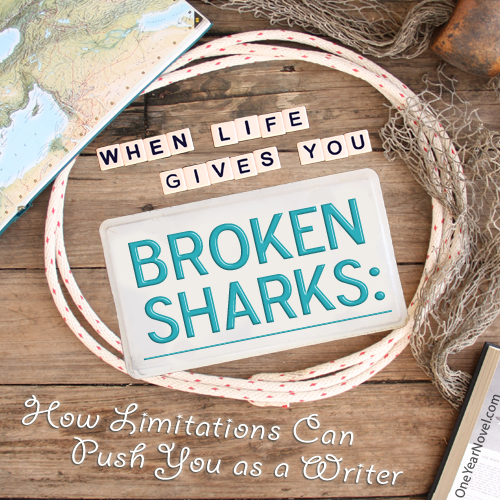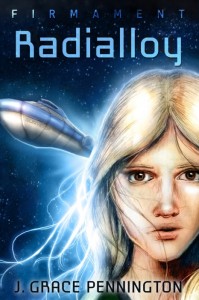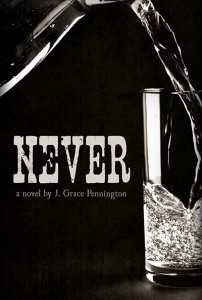How Limitations Can Push You as a Writer
Guest post by J. Grace Pennington
J. Grace Pennington took The One Year Adventure Novel course and went on to write several novels. Her work has won contests, and she has self-published several books on Amazon, in particular Firmament, a science fiction series. Below, she shares her perspective on creative limitations.
 When Life Gives You Broken Sharks
When Life Gives You Broken Sharks
Once upon a time, there was a young man named Steven. Steven was an ambitious filmmaker with one film under his belt—a story about trucks. Being young and brave (and by his later admission, perhaps a little stupid) he thought that a hot new screenplay based on a bestselling shark-attack novel would be a good candidate for his second film. With only a few weeks to shoot, he and his crew headed out to a small island to deal with actors, boats, expensive equipment, and an animatronic shark. What could possibly go wrong?
Their biggest problem soon became apparent. The carefully-crafted shark refused to work for most of the shoot.
A movie entirely about a shark where you almost never even see the shark itself? That sounds like doom for a young filmmaker’s career.
Of course, anyone familiar with Jaws knows that it wasn’t a failure. The film went on to beat The Godfather as the highest-grossing movie of all time. Nor was Steven Spielberg’s filmography over.
Spielberg had several options in this highly stressful and frustrating situation. He could have tried to use the shark anyway, making a cheesy monster movie that wouldn’t have scared a six-year-old. He could have given up in frustration, wasting millions of dollars and writing his own directorial death-sentence. But he didn’t do either of these things.
Instead of bewailing or even simply accepting his limitations, he embraced them. He used them to force himself to be more creative. He decided to craft the film so that we never see the shark until the very end, creating tantalizing suspense as we see the horror the animal causes without actually laying eyes on it until the climax of the story. He used the fact that the shark didn’t work to make a better and more suspenseful film.
How can we apply this to our own writing? On the surface, our possibilities may seem unlimited. We can sit down at our word processors and type out anything our imagination can come up with.
There are, however, still many possible limitations. We are obviously limited by what we know or can find out about. We are somewhat limited by our own experience (“Write what you know!?”). We may be limited by word count, content, or subject if writing for someone else. But, like Spielberg, we can use these limitations to enhance our creativity and improve our craft.
Great writers have been doing this as long as fiction has been around. Charles Dickens published most of his novels as periodicals in magazines, forcing him to create segments that would hold the interest of a reader who’d read the previous installment last week or last month and might not read the next for equally as long. C. S. Lewis wrote by hand, so that his style is naturally structured in small pieces whose length depended on how long it took his pen to run out of ink before he had to refill it. J. R. R. Tolkien used a typewriter, but when he wanted to change something about his work, he had to completely start again from the beginning, rather than make a quick edit in the middle, as we can with computers.
And these limitations served these men well. Dickens’s plots are some of the most intricately gripping in classic literature. Lewis’s style is poignant and filled with concise, contained nuggets of meaning. Tolkien’s work is polished to a degree that most writers only dream of.
Today though, periodicals have mostly gone out of style. People want the whole story now. And most of us use computers instead of typewriters and quill pens.
Technology tends to remove limitations, but sometimes it’s a good idea to create your own, to force yourself to think outside the box and work hard and creatively.
As I started to understand this principle a few years back, I began looking for ways to implement it. I took a tip from Tolkien and started retyping my books when I do a major edit, instead of just sticking edits in the middle. This gives me a much better overall picture of the story and the changes. I also started asking friends to give me lists of random elements (for example, a librarian, post-it-notes, a gravel driveway, a jar of jam, crocheted lace) and then forced myself to write a short story that included all of those elements. Sometimes I even assigned myself random elements to write off of.
Our natural inclination is to be glad when everything is easy and we are relatively unlimited. But usually we have to work against this inclination in order to grow, whether in writing, filmmaking, or life itself. Most of us know from experience that God doesn’t usually hand things to us on a silver platter. He gives us a set of specific circumstances with specific limitations and invites us to use those things to learn and grow into a better person. We can treat ourselves the same way by not only embracing the limitations we have, but at times challenging ourselves with new ones.
When we create boundaries for our stories, and allow ourselves full creativity within those, we will actually have more room to explore what’s inside those boundaries than if we had the whole of the universe to choose from.
…
What limitation do YOU use to your advantage as a creative person? Leave a comment with your own tips!
J. Grace Pennington lives in the beautiful Texas Hill Country with her parents, her eight younger siblings, and her horse, Pioneer. When she’s not writing she enjoys reading good books of all genres, playing movie soundtracks on piano, and looking up at the stars. She blogs about writing at www.jgracepennington.com.






Came over to here from your mother’s blog, Grace. Great article – some good food for thought in there!
Your article is stuffed full of energizing ideas for writers and is an encouragement to a homeschool mom. Thanks